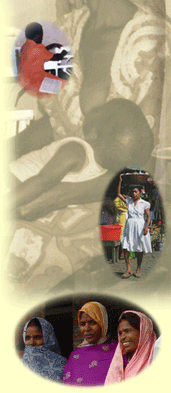
Linking Family Planning and Postabortion Care
In developing countries, the high incidence of postabortion complications
correlates closely with the widespread unmet need for family planning
services. Among married women of reproductive age with a desire to space or
limit the size of their families, less than 20% in Africa—and fewer than
half in Asia—use modern contraceptive methods. In Latin America and the Caribbean, Asia, and Africa, fewer than one-third of women receiving care for postabortion complications have ever used modern contraceptives.
Providing family planning counseling and services as part of PAC increases
family planning access and use, as documented in PRIME pilot projects in Kenya
and Uganda—in which, respectively, 71% and 56% of women suffering from postabortion complications were counseled and received a family planning method following emergency treatment. In El Salvador, where PAC is hospital-based, PRIME trained over 30 key staff members from six regional hospitals in counseling for family planning as part of PAC. And PRIME addressed barriers to increasing the use of postabortion family planning in Kyrgyzstan and Senegal.
Linking treatment for complications from unsafe or incomplete abortion with
family planning and other reproductive health services is especially critical
in light of the fact that HIV continues to spread at alarming rates throughout
the developing world, and women—especially adolescent girls—are
vulnerable candidates for infection. Helping women to improve their
understanding of behaviors that put them at risk of contracting HIV and what
they can do to protect themselves—including partner condom use—should be a priority reproductive health service offered to postabortion women. To help strengthen these links, PRIME paid special attention to counseling and the interaction between client and provider.
|











